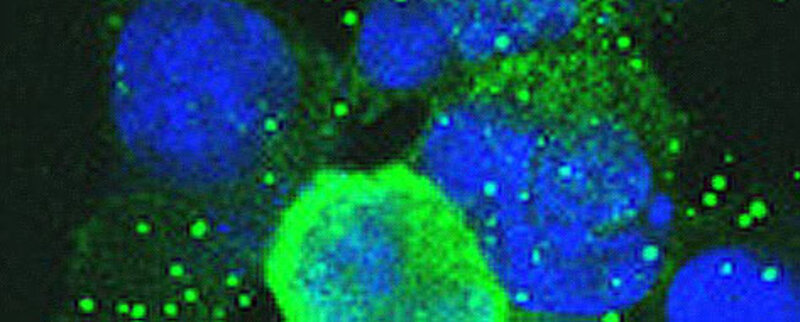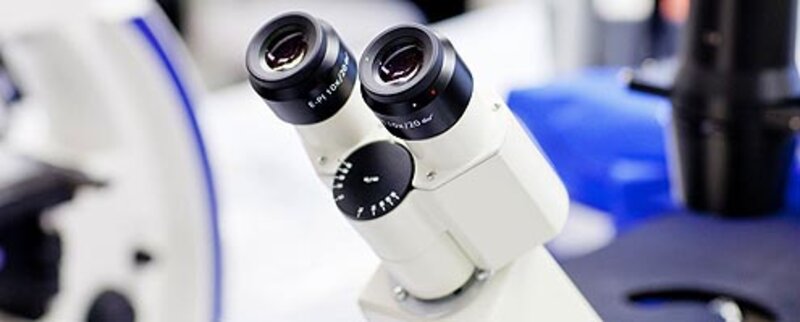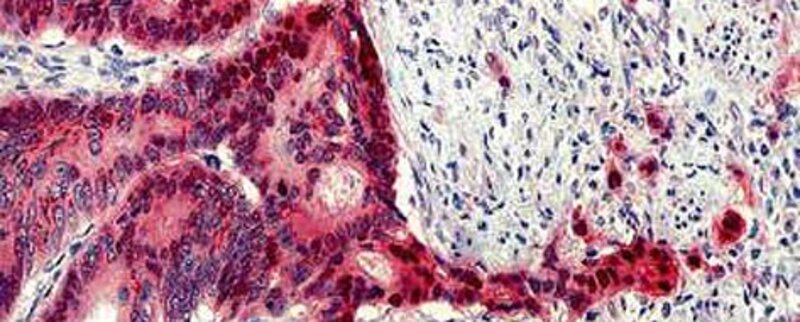Our research focuses
An overview of all currently funded collaborative/large-scale projects can be found on the website of the Medical Faculty of the University of Freiburg.
For scientists involved in patient-oriented research in Freiburg, you will find a guide to helpful structures and services here.

Central to the research focus "Molecular Cell and Tissue Research" is the Cluster of Excellence "CIBSS - Centre for Integrative Biological Signalling Studies"in which scientists have joined forces with the aim of gaining a comprehensive understanding of signaling processes across biological scales. The development of strategies for the precise control of signaling pathways should enable innovations in medicine and plant sciences.
Biological signaling processes form the basis of life for all cells of an organism. Understanding these processes is of fundamental importance for medical research, as they play a decisive role in the development of many diseases.
The SFB / TRR 353 "Regulation of decisions in cell death processes" investigates how the death of individual cells occurs in the organism. Human cells can control their own death and can die in different molecular ways. This consortium wants to understand how the decision for cell death and the selection of the cell death form are made.
In the SFB 1381 "Dynamic organization of cellular protein machineries: From biogenesis and modular assembly to function" investigates how protein machineries control the dynamic cellular events in a living cell and how disturbances of these functions can lead to diseases.
The most common cause of disease and death worldwide are diseases of the cardiovascular system. These diseases are associated with tissue remodeling processes (atherosclerosis and aneurysms through to cardiac fibrosis and scarring), whose influence on patient well-being - despite the impressive success of modern surgical, interventional and drug therapies - is still insufficiently understood. Vascular research focuses on the mechanistic analysis of inflammatory processes and the development of immunomodulatory and minimally invasive therapeutic strategies. In cardiac research, the type and properties of non-muscle cells and their interaction with other cells in cardiac lesions are a core topic of basic and applied research at the Medical Faculty of Freiburg.

The human immune system has evolved to fight off infections. However, if it is not properly controlled, it can also turn against its own body and cause severe inflammation. The research focus "Immunology and Infectiology" seeks to gain an understanding of the human immune system by studying infectious diseases (e.g. caused by hepatitis viruses, staphylococci, influenza) and inflammatory diseases (e.g. inflammatory bowel disease, multiple sclerosis, rheumatism, graft-versus-host reactions).
Researchers of the SFB 1160 "Immunopathology due to impaired immune responses (IMPATH)" aim to contribute to a better understanding of immunopathology resulting from impaired immune responses. The researchers involved in the CRC / Transregio (TRR) 179 "Determinants and dynamics of elimination versus persistence in hepatitis virus infections" are investigating the interactions between immunological and virological parameters and their dynamics, which determine the course of a hepatitis virus infection.
In the SFB / TRR 359 "Perinatal development of immune cell topology (PILOT)" scientists from Freiburg, Munich, Aachen, Würzburg and Braunschweig are investigating how internal and external influences around birth shape immune development in infant body organs such as the skin, lungs and intestines. The aim is to decipher the immunological conditions for the best start in life.
A special crystallization point is the nationwide unique Center for Chronic Immunodeficiencywhich brings together all scientific expertise in the field of immunodeficiency at the Freiburg site. The aim of the doctors and scientists is to better understand the causes of immunodeficiency and to improve the diagnosis and treatment of immunodeficiency diseases.

Epigenetics is an innovative field of research that deals with mechanisms of heredity that go beyond genetic determination. These are dynamic changes in which changing environmental conditions such as nutrition, stress and medication leave behind epigenetic patterns.
The scientists of the Collaborative Research Center (CRC) 1453 "Nephrogenetics (NephGen)" will use findings on monogenetic and complex genetic kidney diseases to identify and characterize molecules and signalling pathways that represent targets for better prevention and treatment of kidney diseases.

Tumor research has a long tradition in Freiburg. The German Research Foundation has already funded many SFBs on oncology. The results of tumor research are implemented in patient care at the University Medical Center. Here, the Comprehensive Cancer Center Freiburg as one of the top oncology centers in Germany recognized by German Cancer Aid, and the German Consortium for Translational Cancer Research with its location in Freiburg, play an important bridging role.
In the SFB 1479 "Oncogene-driven Immune Escape (OncoEscape)" clinical and basic tumor biologists and immunologists are working together on the scientific hypothesis that oncogenic signaling pathways and immune escape mechanisms are closely linked. This concept implies that a targeted influence on the "immune escape" triggered by oncogenes could lead the treatment of various types of cancer beyond palliative therapy towards a cure.

One third of people will be affected by a neurological disease such as Parkinson's or epilepsy in the course of their lives. Since the 1980s, research into the brain, its functions and the development of new therapies for the treatment of neurological diseases has established itself at the Faculty of Medicine in Freiburg as a research focus with international reach. The activities cover a broad spectrum: they range from research into molecular biological processes in the central nervous system and communication between nerve cells to studies with patients at the University Medical Center.
The interdisciplinary collaboration of neuroscientists in transregional research networks is outstanding in Freiburg. In the 2017 started SFB / TRR 167 "Development, function and potential of myeloid cells in the central nervous system (Neuro-Mac)" researches the immune defense of the brain.
How information from the outside world is represented in neuronal networks of the brain is a scientific focus of the Freiburg neuroscientists. In the collaborative and interdisciplinary research center started in 2024 SFB / TRR 384 "Inhibitory neurons: Shaping the cortical code (IN-CODE)" scientists in Freiburg, Berlin and Heidelberg want to investigate how inhibition in the brain contributes to encoding, storing and retrieving information from the outside world in order to control behavioral processes.
Innovation in translation
The cross-cutting topic of "Innovation in Translation" stands for a transformation process in the healthcare sector in which scientific discoveries are transferred from the laboratory to specific clinical applications. This dynamic area focuses on accelerating the translation of promising research findings into clinical application, thereby ushering in the era of personalized medicine with the aim of improving patient care.
In addition to their research focus, the following collaborative research projects are also active in the cross-cutting topic of "Innovation in Translation":
SFB 1160 Immunopathology due to impaired immune responses (IMPATH)
SFB 1479 Oncogene-driven immune escape (OncoEscape)
SFB / TRR 167 Development, Function and Potential of Myeloid Cells in the Central Nervous System (Neuro-Mac)
SFB / TRR 359 Perinatal development of immune cell topology (PILOT)
SFB / TRR 179 Determinants and dynamics of elimination versus persistence in hepatitis virus infections
Medical data science
Novel approaches in the cross-cutting field of medical data science are fueling a revolution in biomedical research and healthcare, using a variety of data sources to gain scientific insights and make better decisions for patients. In this interdisciplinary field, technologies such as artificial intelligence are being developed to fully unlock the potential of biomedical data through a data-driven approach, improving the modeling of mechanisms, diagnoses and treatment strategies.
The SFB 1597 "Small Data" develops methods to discover complex patterns even in relatively small data sets using artificial intelligence and modeling techniques. This requires a highly interdisciplinary approach that combines knowledge from computer science, mathematics, statistics, medicine and system modeling - and establishes a common language between researchers from the various disciplines.
In addition to the work in the research focus area "Genetics and Epigenetics", the SFB 1453 "Nephrogenetics (NephGen)" is also active in the cross-cutting topic of "Medical Data Sciences".
University Medical Center Freiburg
Hugstetter Straße 55
79106 Freiburg
Phone: 0761 270-0
info@uniklinik-freiburg.de

